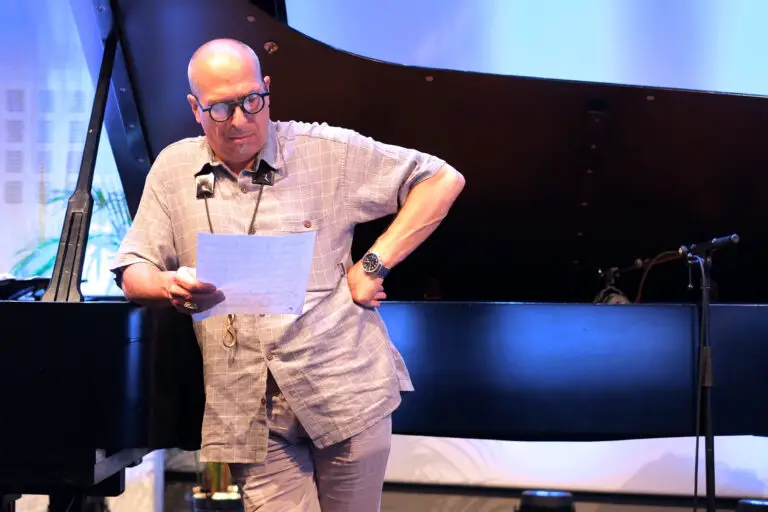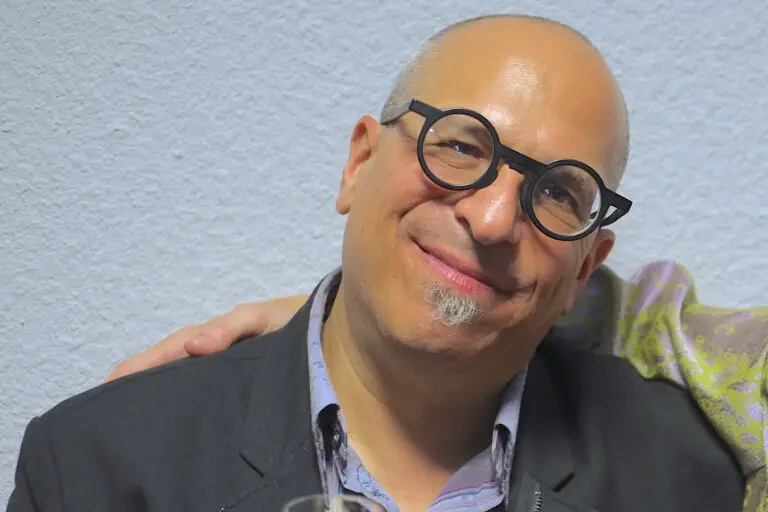Baritone saxophonist Gary Smulyan from Bethpage, New York is a gifted multi-instrumentalist whose music career began on the alto saxophone in his teen years on Long Island. Today, Smulyan is critically acclaimed and recognized as the major voice on the baritone saxophone. Smulyan is known for his aggressive rhythmic sense, his intelligent and creative harmonic approach and a strong and incisive wit.

While still in high school, he had the chance to sit in with major jazz artists such as legendary trumpeter Chet Baker, saxophonist Lee Konitz, trombonist Jimmy Knepper and violinist Ray Nance. He studied at Hofstra University before working with Woody Herman and leads a trio with bassist Ray Drummond and drummer Kenny Washington.
Gary Smulyan is a multiple winner of the DownBeat Critic’s and Reader’s Polls and numerous other official polls, including the Jazz Journalists Award for Baritone Saxophonist of the Year. He is a six-time Grammy Award winner for his work with B.B. King, Lovano, Holland, and the Vanguard Jazz Orchestra.
Smulyan has recorded and performed worldwide with Freddie Hubbard, Dizzy Gillespie, Stan Getz, Ray Charles, B.B. King, Tom Harrell. Cedar Walton, George Coleman, Joe Henderson, Joe Lovano, Tommy Flanagan, Chick Corea, Diana Ross, Clark Terry, Kenny Wheeler, Charles McPherson, James Moody and Slide Hampton, among others.

Rob Smittix from Xperience Monthly spoke with Smulyan on a range of topics
Rob Smittix: Where are you based out of?
Gary Smulyan: I live in Yonkers, New York. Just north of New York City.
RS: Oh yeah New York City’s hat, I’m familiar, it’s like the extra piece of the Bronx.
GS: Yeah, we’re just north of Riverdale which isn’t very far, just near the Bronx border.
Every time I come up to Troy, the pressure is on because that’s Nick Brignola’s home territory. Bring your best game every time you play in Troy because the spirit of Nick Brignola is hovering all over the place up there.
RS: That’s right!
GS: It’s an inspiring place to play.
RS: And Troy is really up and coming, a lot is starting to happen there.
GS: A lot of it is Joe Barna too. Joe’s the real deal. He creates things and makes music happen. He finds places to play, he finds musicians to play with, he creates venues, he creates opportunities for musicians, both who live there and from out of town. Joe is making it happen. I tip my hat off to him for all of the hard work that he’s doing.
RS: Oh, absolutely. We have an award show called the “Listen Up Awards” and Joe actually won that and he had a fantastic speech. Ever since that I’ve really been in Joe’s corner for sure.
GS: So, what was that award for?
RS: He won the favorite jazz musician award for the region.
GS: Okay, that’s well deserved.
RS: It was favorite too, it wasn’t the best, so it shows that people like him.
GS: Well, you know I think a big part of it is that Joe is providing places for people to hang out and listen to music. Especially now, I think it’s incredibly important. After COVID happened, people are getting more comfortable with going out now and they’re getting excited about hearing live music, supporting live music and being able to get out of the house. To have venues like what Joe is doing, I think is really appreciated by the public. They’re really glad that he’s doing it and they’re very happy to support it and get out for a night and hear some music.
RS: What’s really cool too is that he’s leading the jazz scene, but the goal is to link various genre scenes together here. It’s something that hasn’t been done in a really long time.
GS: So, what do you mean like clubs are supporting each other?
RS: Yeah finally. People are starting to get out of their little groups and are starting to get out and support each other. There’s still a lot of work to do and we’re starting to see a difference.
GS: That’s important, everyone’s successful if you do that.
RS: Yeah, we’re finally scratching the surface.
GS: Wow that’s great news. To be so separated and protective of your little scene, doesn’t really help the scene as a whole.
RS: I’ve been saying it for years.
GS: No. I agree with that. Especially in a place like Troy, you know? Because it’s not New York City, it’s a smaller scene, so you really have to do that to ensure the success of everybody. It’s not just about one place or two places, it’s about everybody being successful and the only way to do that is to support everybody. It’s important, man. So, for me because I haven’t been to this new venue yet. I’ve played in the region quite a few times, so to discover a new place and to see how people come out and react and support; I’m excited about seeing what it is and what the scene is going to turn into. I hope it really is successful.
RS: I don’t know if you actually change this on your ID or your passport but how long has it been since your first name became Grammy-Winner?
GS: I don’t know, I don’t think of myself like that. I’m just trying to play music and get better, I don’t know. I’ve been fortunate enough to be a part of a number of projects that have won Grammys. It’s been an honor and a thrill but I don’t focus a lot on that honestly. The bottom line is that it’s the work that’s important right? So, Grammy winner, the thing is other people do that I don’t add that, when I talk about myself. I’m happy other people do it and maybe it helps sell a few tickets or something, but I don’t think of myself in that way.
RS: It’s like when I’d bring somebody to town and you never would’ve known they used to be in such and such a band, so you throw it on the flier and it helps put butts in the seats.
GS: Oh yeah, of course, from an advertising point of view you have to do that.
RS: Right.
GS: I actually don’t talk about myself like that at all. I’m just happy to have been a part of these projects over the years. I’ve been really fortunate and in the right place at the right time and I’ve been really fortunate to have played on these beautiful records.
RS: That’s the thing, it’s really about the music and the end product. I’m just really feeling bad for the kids these days. When I say kids I mean the generation that never knew the world without the internet.
GS: Yeah, I think about that all of the time. With cellphones and computers and not really having the opportunity to go record hunting. There are so many distractions today that take young people away from the essence of trying to learn music. I agree with you. I think it’s very hard and also the opportunity to go play. I was with Woody Herman’s band when I was 22. I left school and went on the road for two years and that’s where I really honed my craft. Those big bands that toured all of time, it’s kind of over. On the flip side though, young musicians are really learning to use social media to further their careers, which is something that I’m not very good at. I’m an old guy, I’m 66 and I find that very challenging. The world is shifting from going on the road to posting a video of you playing something and having people look at it and that’s how you get hired now. That’s the platform where young people are getting gigs now. It’s fascinating to me but it’s a world that I find mystifying, I don’t have my head wrapped around it yet. You know? Putting up a video and seeing how many hits you get and all of that. But some young musicians really have that down, really get it and use it in a positive way to further their careers. Whether they’re teaching, performing or both, that’s where the scene is going now.
RS: You’re not kidding, it definitely is.
This interview originally was published in The Xperience Monthly
Catch Gary Smulyan perform in NYC in February and March, and find more dates here.
February 6, 2023 – Vanguard Jazz Orchestra, Village Vanguard
February 13 – 20, 2023 – Vanguard Jazz Orchestra Thad Jones Centennial week, Village Vanguard
March 18, 2023 – Cafe Bohemia


Comments are closed.